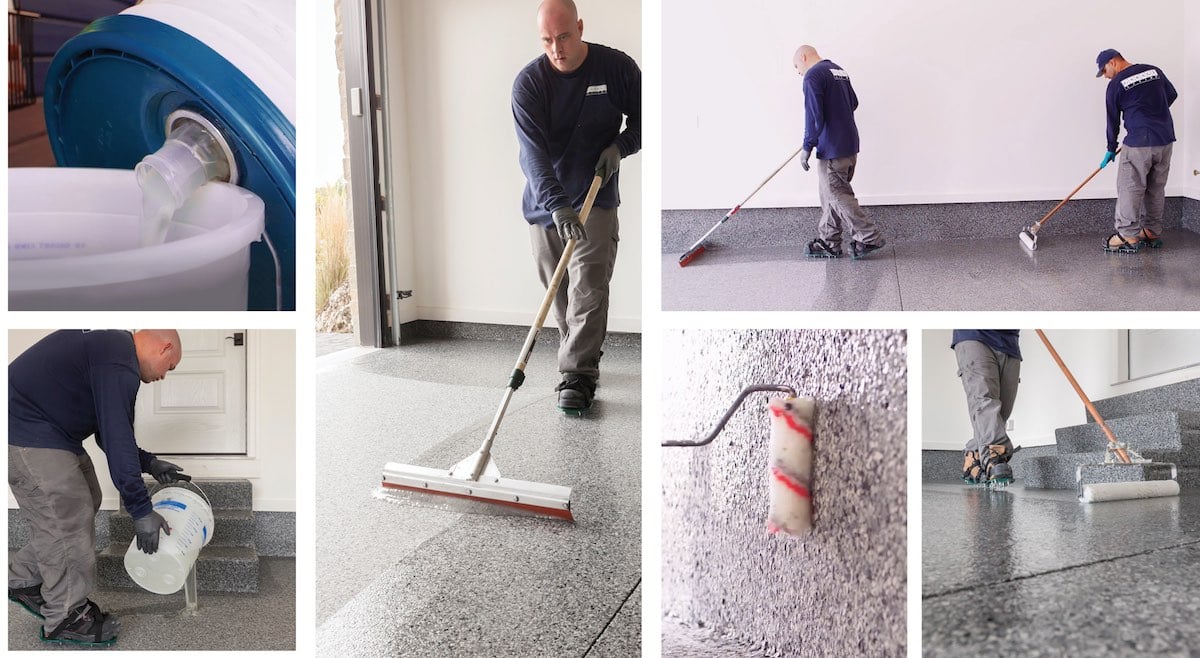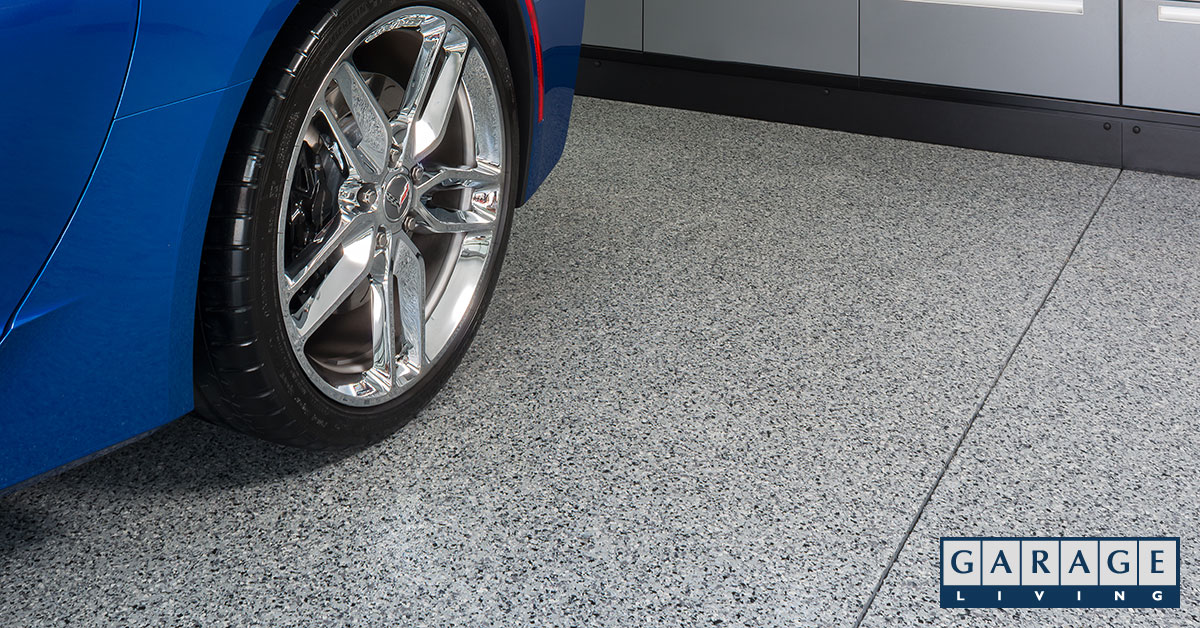It’s a common misconception that homes located in northern climates are unable to get a new garage floor coating in the winter. This is simply untrue…provided you use the right type of garage floor coating.
With a polyaspartic floor coating, you have a lot more flexibility in terms of when it can be used. Its year-round usability is just one of several advantages that polyaspartic coatings have over epoxy coatings.
As you’ll discover, there’s no need to wait until the weather warms up in the spring to enjoy the benefits that a new garage floor coating provides.
There are even a couple of advantages to having your damaged floor rejuvenated with a polyaspartic garage floor coating in the winter.

Our professionals adjust the mixtures and materials used during the garage floor coating process to suit specific temperature conditions.
1. Cold temperatures won’t delay your garage floor project
To apply an epoxy garage floor coating, a minimum temperature of 50-55° F (10-13° C) is required. Urethane garage floor coatings require a minimum temperature of 40° F (4° C) to be applied. That significantly restricts the times of year they can be used on garage floors located in colder climates.
Compare that to the versatility of a polyaspartic garage floor coating like Floortex™. Getting a garage floor coating in the winter isn’t a problem when this high quality product is used for the job. That’s because Floortex™ garage floor coatings can be applied in temperatures as low as -40° F.
We can carry out flooring projects during the colder weather by making adjustments, based on the temperature, of the Floortex™ mixture and materials used. The application versatility of polyaspartic coatings also lets them be used when the temperatures are blazing hot.
Colder temperatures do affect how long the curing time for the flooring top coat takes. It can take up to 24 hours before foot traffic can resume and between 24-96 hours before vehicles can use your garage again.
A Garage Living representative will let you know how climate factors will affect the curing time for your particular garage flooring project.
2. A garage floor coating in the winter has the same quality
Getting a polyaspartic garage floor coating in the winter provides you with the same level of flooring surface quality as a floor that’s done when the weather is warmer.
You’ll still get a durable, attractive floor surface that’s easy to maintain and provides the following benefits:
- a UV stable topcoat that prevents the floor from fading and yellowing over time
- exceptional impact and abrasion resistance
- highly resistant to most household chemicals and automotive fluids
- guaranteed not to blister, flake, or peel
- ability to customize floor with a range of available colors
- textured surface provides better traction than epoxy floor coatings
And whether you get your garage floor coating in the winter or any other time of the year, Garage Living still provides the same 10 year limited warranty after every flooring application. And the entire process can still be completed in as little as one day, depending on the weather.
3. Get your new garage floor quicker
Now that you’re educated about the fact that getting a garage floor coating in the winter is indeed possible in colder climates, you can use that information to your advantage.
Because many people wrongly presume they need to wait until the spring or summer to get their floors redone, the lead time to book a garage flooring project is actually shorter in the winter.
Our work crews aren’t quite as overwhelmed with scheduled projects as they are during the warmer months of the year. That means the time between booking your initial design consultation and the flooring project being completed will typically be shorter in the winter than during the spring and summer months.
4. Protect your floors from damaging road salt
Road salt brought in to your garage on your vehicles during the winter leaves ugly white salt stains on the floor. The salt can also take a real toll on your garage floor’s durability over a long period of time.
That’s because melted salt mixed with water from rain and melted snow gets down into the floor’s cracks and then refreezes again when the temperature drops. This puts extra stress on the natural expansion and contraction process that a garage floor experiences with changes in temperature. Over a period of time, the floor will be more likely to crack and existing cracks will only get longer and deeper.
Getting a polyaspartic coating applied before the winter begins provides you with the best protection for your garage floor. But even getting a garage floor coating any time before winter ends can save your floor from the ravages of road salt.
Even with durable protection, garage floors still need to be cleaned occasionally during the winter months. A smooth Floortex™ floor coating makes it even easier to maintain a clean floor during the winter and all throughout the year.

Year-round garage floor coating applications are possible when you use a polyaspartic floor coating like Floortex™.
5. Enjoy a better-looking garage floor
Making the wise decision to get your garage floor coating in the winter and not later on means you’ll get to enjoy a better-looking garage floor that much sooner.
A new garage floor, especially one with the aesthetic benefits that the decorative flakes used in the Floortex™ application process provide, can have a huge impact on a garage’s overall look.
You’ll have a fresh, durable garage floor surface that’s all ready to take on the heavier foot traffic that comes with the increased usage of your garage when the warmer spring weather arrives.
Garage makeover solutions all year round
Along with taking care of your garage floor coating project, Garage Living’s other garage makeover solutions are also capable of being installed any time of the year.
Schedule your free design consultation with us today.